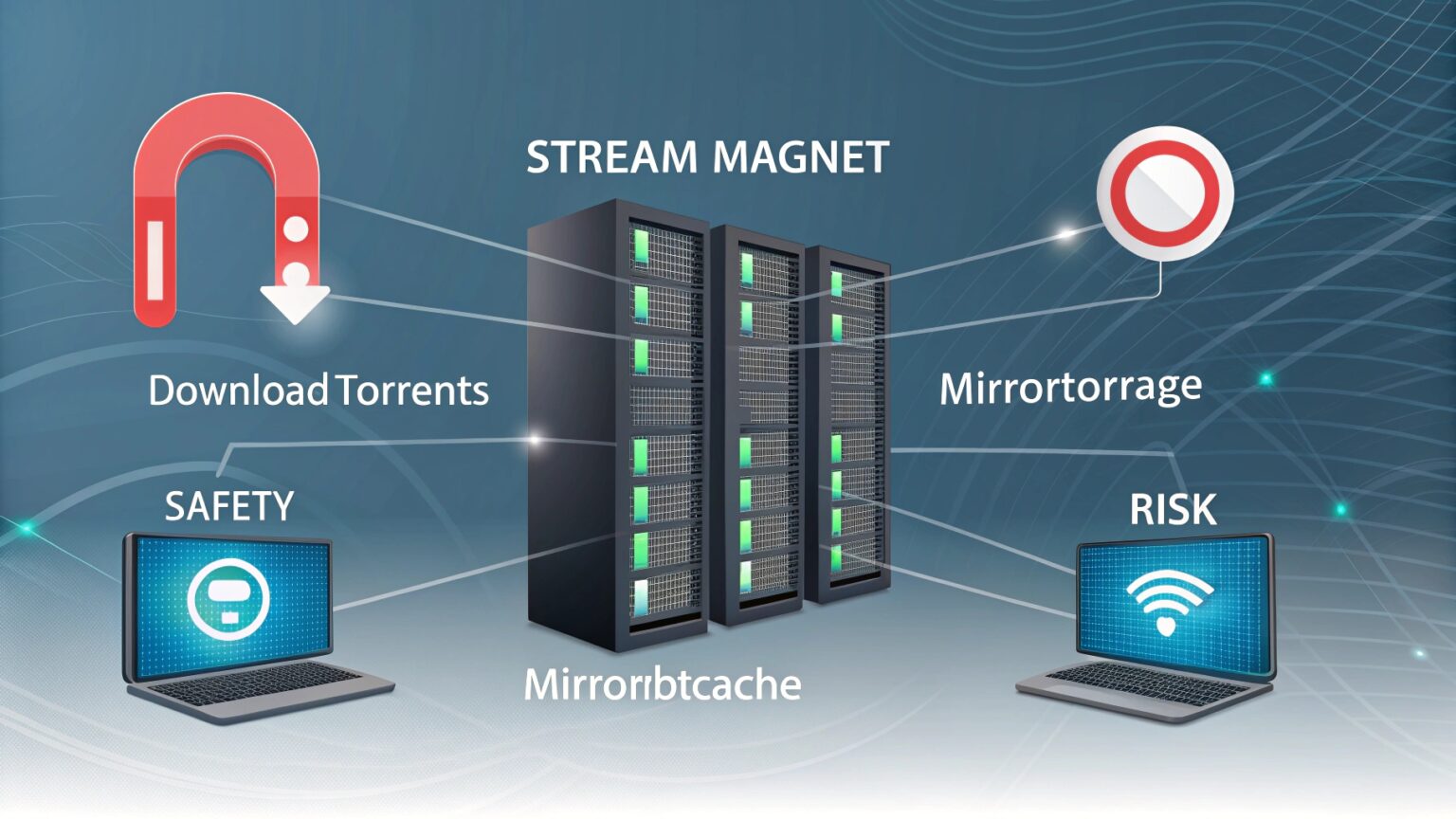The phrase “stream magnet downloaditorrents mirrortorrage mirrorbtcache” combines multiple terms often linked with digital file access and torrent indexing. While these terms are frequently searched, it’s important to understand them in a legal, safe, and educational context. This article explores what these terms mean, their risks, and safe alternatives, while emphasizing responsible use.
What Are Magnet Links & “Stream Magnet”?
Magnet links are unique identifiers that allow peer-to-peer sharing without needing a separate file. Instead of downloading a small “.torrent” file, a magnet link contains the hash value that locates the file across a distributed peer-to-peer network. “Stream magnet” refers to the idea of playing media directly through a magnet link, but this often depends on third-party software or services, many of which may not be legal. The distinction between streaming and downloading is important: streaming means real-time playback, while downloading means storing a copy.
Keyword Entities Overview
downloaditorrents usually refers to services claiming to provide torrents directly, but they often come with major risks such as malware and false links. mirrortorrage refers to mirrored domains or clones of indexing sites that reappear after takedowns. These mirrors are rarely official, making them unsafe. mirrorbtcache relates to cached or reindexed torrent sources, often duplicating the same data from original sites. While they may sound like backups, they typically increase exposure to harmful or illegal content.
Legal & Ethical Considerations
The use of torrent indexes, mirrors, and magnet-based streaming is subject to copyright laws. Many of the sites with names similar to “mirrortorrage” or “mirrorbtcache” host or index copyrighted material without permission, making them illegal in most jurisdictions. However, torrents and magnet technology themselves are neutral tools. They can be used legally for public domain media, open-source projects, and Creative Commons works. Distinguishing between legal and illegal usage is crucial to avoid copyright infringement.
Security Risks & How to Stay Safe
Unverified torrent mirrors and magnet-based streaming sites pose high risks, including malware, spyware, phishing, and browser hijacks. Many mirrors insert malicious ads or bundle files with dangerous executables. There is also the risk of privacy leaks, since torrent activity exposes IP addresses to the network. Even if the content itself is not harmful, fake mirror domains can easily deceive users. For safety, users should avoid engaging with unauthorized mirrors and instead focus on official and licensed sources.
Safe, Legit Alternatives to Magnet/Index Sites
There are many legal platforms that provide safe access to media. Licensed streaming services (Netflix, Amazon Prime, Disney+, Spotify, etc.) offer wide catalogs with secure delivery. Open-source communities like Linux distributions and public domain archives (e.g., Project Gutenberg, Internet Archive) use torrents and magnet links in a legal way. Creative Commons libraries also make use of this technology for ethical sharing. Choosing these legitimate options ensures both legality and safety.
Best Practices for Research-Only Use
If researching torrent and magnet ecosystems academically, it is important to rely only on trusted documentation, transparency reports, or peer-reviewed sources. Never download or execute unknown files from mirror domains. When evaluating the ecosystem, focus on technical and policy analysis rather than actual file acquisition. Always include disclaimers if covering the topic in blogs or reports.
Technical Concepts Explained
Distributed Hash Tables (DHT) are decentralized systems that allow peers to find each other without relying on a central tracker. Swarm health refers to the number of seeders and leechers in a torrent network. Mirror proliferation happens because original domains are often taken down due to copyright claims, leading to constant replication under new names like “mirrortorrage” or “mirrorbtcache.” These technical concepts explain why these terms keep appearing in searches.
Regional Policy & Compliance Notes
Different regions treat torrent indexing differently. In many countries, ISPs are required to block access to torrent mirror domains. Universities and workplaces also enforce strict acceptable-use policies. In the European Union, data privacy laws like GDPR apply to user tracking on such sites. Users must be aware that attempting to access mirrors may not only violate copyright but also local network policies.
Editorial Guidance for Site Owners/Bloggers
Writers covering “stream magnet downloaditorrents mirrortorrage mirrorbtcache” must prioritize safe and legal explanations. Avoid linking to unauthorized sites, and instead explain concepts in an educational way. Always include disclaimers and provide legitimate alternatives. Adding expert opinions, citing laws, and encouraging ethical use improves credibility and aligns with search engine requirements for expertise, experience, authority, and trustworthiness (E-E-A-T).
Conclusion: Responsible Access & Safer Choices
While the terms “stream magnet downloaditorrents mirrortorrage mirrorbtcache” may attract interest, most mirror sites and torrent indexes are risky and often illegal. Magnet technology itself is neutral and useful, but only when applied to open-source or licensed content. The responsible path is to use legal platforms, support creators, and stay secure online.
FAQs
What is a magnet link and how is it different from a torrent file?
A magnet link contains a unique hash that locates a file across peers, while a torrent file is a small file that stores tracker and peer information.
Are mirror sites legal to use?
Most mirror sites of torrent indexes are illegal since they often host copyrighted content without permission.
Why are mirror domains like “mirrortorrage” or “mirrorbtcache” risky?
They are usually clones of taken-down sites, often laced with malware, phishing attempts, or intrusive ads.
What are legitimate alternatives for watching or downloading content?
Legal streaming services, public domain archives, and open-source platforms offer safe and authorized access to media.
How can I learn about DHT and P2P safely and legally?
You can study distributed systems, peer-to-peer networking, and blockchain technology from open educational resources or academic courses without downloading unauthorized files.
